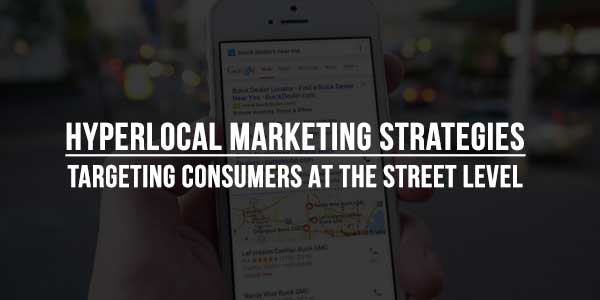
Hyperlocal marketing strategies are powerful tools for connecting businesses with their immediate communities. These targeted approaches, tailored to specific neighbourhoods or even streets, prioritize reaching consumers in a highly relevant and impactful manner!
Table of Contents
Understanding Hyperlocal Marketing:
Hyperlocal marketing focuses on engaging with people at the street level, tailoring strategies to specific neighbourhoods. Unlike broad marketing approaches, hyperlocal tactics aim for precise targeting, maximizing relevance. As such, these strategies require a high level of awareness of just what your targeted community is all about! If you have a solid understanding of their preferences and needs, you can massively increase the potential of your marketing.
Leveraging Geolocation Technology:
Out of all the tools to promote your business this way, geolocation tech is one of the most useful ones. Geolocation technology enables businesses to pinpoint the exact location of potential customers, allowing for highly targeted advertising. Thankfully, platforms like Google Maps and Yelp offer powerful tools for companies to leverage geolocation data effectively. By utilizing geotargeting features, businesses can ensure that their ads are shown to people in specific locations, increasing engagement. For example, a local restaurant can target ads to users within a certain distance, attracting them with special offers or promotions.
This precision targeting maximizes the effectiveness of marketing efforts and improves return on investment. Geolocation technology can help companies better understand their audience by providing insights into customer behaviour and preferences. By analyzing this data, businesses can tailor their marketing strategies to better meet their community’s needs.
Optimizing Google My Business Listings:
Having a strong presence on Google can honestly make or break a business. Google My Business is a free and surprisingly versatile tool for managing your online presence across Google! By optimizing listings, companies can increase their visibility in local search results, making it easier for customers to find them. One key aspect of optimization is that all information needs to be accurate and up-to-date. That must most notably cover an exact address, phone number, and business hours. After all, with them, you help customers find your business and improve its credibility.
Likewise, companies should regularly update their listings with high-quality images and relevant keywords to enhance visibility. Positive reviews can also significantly improve a business’s ranking on Google My Business. So, encouraging satisfied customers to leave reviews and responding to negative feedback can help build a positive online reputation.
Crafting Compelling Local Content:
By creating content that resonates within your community, you can earn a niche and loyal following more easily. One approach is to produce neighbourhood guides that highlight the area’s best attractions, restaurants, and activities. That provides residents with valuable information and showcases your business’s knowledge and expertise.
Another strategy is to cover local events and news stories, demonstrating the business’s involvement and commitment to the community. From there, companies can also share stories and testimonials from satisfied customers, showcasing their positive impact on the community. However, when crafting local content, use language and imagery that resonates with your target audience and incorporates relevant keywords for SEO purposes.

Engaging With Local Influencers:
Nowadays, consumers often turn to influencers for recommendations and advice. So, by collaborating with influencers with a strong presence in your local area, you can tap into their followers’ networks and gain exposure! That is why it’s a great idea to partner with influencers to create sponsored content that authentically showcases your products or services. If you do, you can increase brand visibility and build trust with potential customers.
If that’s not enough, businesses can also collaborate with influencers to host events or promotions, leveraging their influence to attract attendees and generate excitement. Still, when selecting influencers to work with, choose only those whose values align with the brand and whose audience demographics match the target market!
Building Partnerships With Nearby Businesses:
Building partnerships with nearby businesses is a savvy strategy for expanding reach and boosting brand visibility within the local community. After all, collaborating with complementary businesses can yield mutual benefits and enhance overall success. A nifty approach is forming cross-promotional partnerships, where businesses promote each other’s products or services to their customers. For example, a local confectionary store could partner with a nearby coffee shop.
Then, they can offer a special discount for customers who purchase from both establishments. That drives foot traffic to both businesses and even introduces each brand to new potential customers. Another option is to co-host events or workshops, leveraging the strengths and resources of both businesses to create memorable experiences. However, choose partners carefully and ensure alignment with the brand’s values and target audience. Likewise, avoiding low-quality backlinks and similar partnerships is necessary to maintain credibility and protect your brand’s reputation.
Implementing Hyperlocal SEO Strategies:
A solid handle on hyperlocal SEO strategies will be one of your priorities. That lets you optimize website content for local keywords and phrases, ensuring the business appears in relevant search queries. That includes incorporating location-specific terms into meta tags, headers, and content throughout the site. Furthermore, creating location-specific landing pages can help companies target multiple areas and improve their chances of ranking in local searches.
You’ll need to maintain your SEO once everything is in place. Google tends to shift things around by updating its algorithm to reflect the newest user preferences. So, you won’t be able to rest on your laurels, and your SEO will require regular audits! If you don’t have those scheduled, your past SEO work will eventually start working again.
Leveraging Local Directories And Listings:
Leveraging local directories and listings is an important aspect of hyperlocal marketing strategies. After all, consumers often turn to online directories like Yelp, Google My Business, and Yellow Pages to find local companies. Therefore, ensuring your business is listed accurately and consistently across these platforms maximizes your visibility. That includes providing up-to-date information such as address, phone number, website URL, and business hours. Additionally, companies should optimize their listings by including relevant keywords and categories to improve their chances of appearing in searches. Monitoring and responding to customer reviews is also important since positive reviews can enhance credibility and attract more customers.
Leveraging The Hyperlocal Marketing Strategies:
As businesses navigate the dynamic landscape of consumer engagement, hyperlocal marketing strategies remain indispensable for fostering meaningful connections within local communities. By embracing the nuances of neighbourhood-level targeting and leveraging real-time data, businesses can position themselves as fixtures within their community. As such, the importance of such marketing strategies will only grow, serving as the cornerstone for driving community sustainable growth.

 About the Author:
About the Author:
















Be the first to write a comment.